Reaching the forgotten
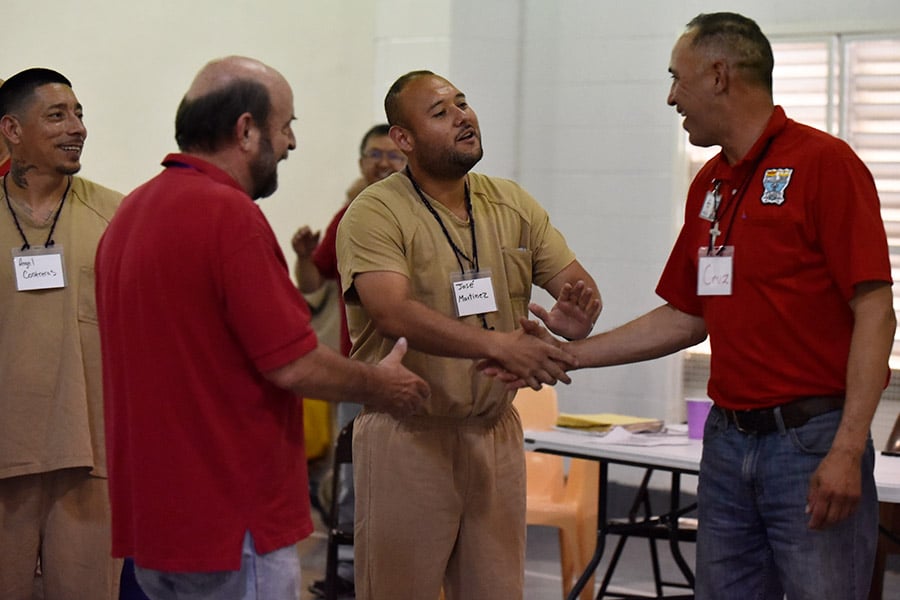
Inmates shake the hand of Cruz Jimenez after a singing performance at the Kolbe Prison Ministries retreat at the Bridgeport Unit in Bridgeport. (NTC photo/Ben Torres)
Volunteers received and returned hugs, handshakes, and high fives as they worked through the double line of about 60 inmates early morning May 19 at Bridgeport Correctional Facility — not a scene most associate with prison life and also a first for the Diocese of Fort Worth.
Kolbe Prison Ministries, already active in the Diocese of Dallas and elsewhere, held a May 18-20 retreat at Bridgeport. Most attending, volunteers readily admitted, likely showed for the free food of higher grade than normal prison fare. Volunteers’ hope and belief, however, is that they left with much more.
Kolbe Prison Ministries was founded in 2009 by a group of Catholic men in the Texas Hill Country with an eye toward ministering God’s word in Texas prisons.
Assumption of the Blessed Virgin Mary Church in Decatur parishioner and lay minister Howard Biel had already logged seven years of prison ministry involvement at Bridgeport when an inmate, Christopher Humble, suggested a Kolbe retreat.
“Kolbe is like an ACTS retreat, except it’s here,” said Biel, who participated in an ACTS retreat several years earlier that changed his life.
Biel worked with Minh Tran, who was already involved in Kolbe in another diocese.
Biel’s introduction to prison ministry came suddenly, he joked.
“I asked a deacon one day after Sunday Mass what I could do to help,” Biel said. “So he says, ‘Come with me,’ and brought me to prison.”
A pharmacist, Biel had experience with abusers fraudulently attempting to procure prescription drugs and generally held a sour view of those in prisons.
“My idea then was they need to be here,” Biel said. “They’ve obviously done bad and we need to punish them and have a bad attitude toward these guys.
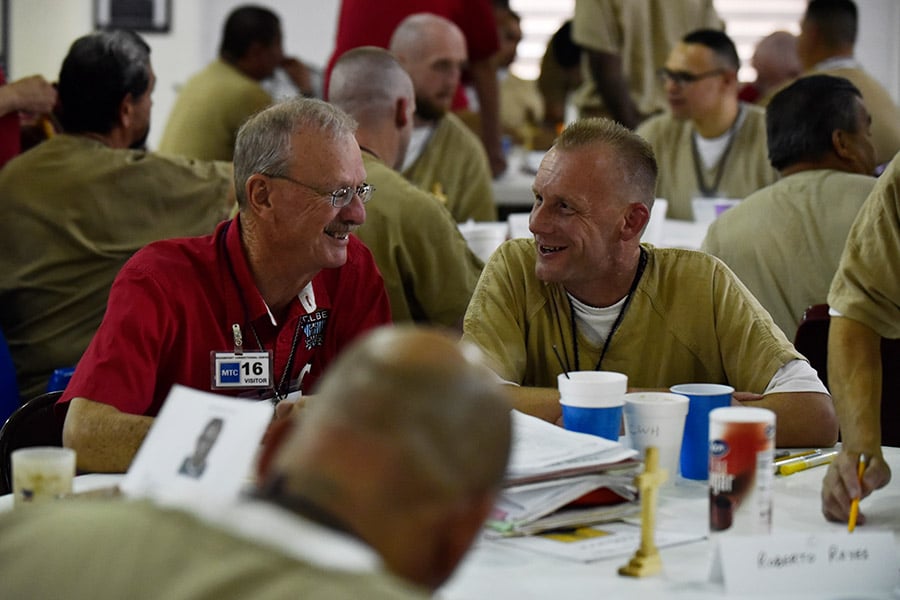
Catholic volunteer Larry Reeh speaks with inmate Christopher during a discussion about saints with inmates of the Bridgeport Unit during the Kolbe Prison Ministries retreat in Bridgeport, Texas, May 18, 2018. (NTC photo/Ben Torres)
“But I got involved here and realized, frankly, we’re all sinners and all have histories. So now I come bringing the word of the Lord and bringing my love, but what I get is more. I never ask what they did but I know these guys are having to pay serious consequences, and so I ask, ‘What can I do, God?’
“I’ve found all I can do is hug them and tell them God loves them because once a person realizes that, that’s all that matters. And maybe we’re the only ones who have ever said that to them in their lives.”
St. Elizabeth Ann Seton parishioner Tran said he’s been involved with prison ministry for 12 years and Kolbe for 6 simply because he wants to share God’s graces with people in prisons.
“I see no difference between them and anyone else,” Tran said. “We’re all children of God and whoever God puts in front of me, those are the people God wants me to talk to.”
Biel, noting the need for more prison ministry volunteers for his and all prison ministry groups, agreed.
“Most probably think inmates should be punished and that collecting coats for people in winter or fighting against abortion are more important,” Biel said. “Those things are important. But what does it say in Matthew 25 about you came to visit me in prison?
“It hurts me as a Catholic to see a lot of people hold that view. I’m not casting stones because I was at that same place once. But people need to think of what Jesus said and focus on that.”
Humble echoed Biel’s call for more help.
“More volunteers [for prison ministry] are definitely needed,” Humble said. “We’re just people who made mistakes but are now trying to better ourselves.”
Like the famous Las Vegas ad, what happens in prison ministry sessions stays in those sessions. But Humble expresses no reticence discussing his past and incarceration though he’s more passionate in detailing his search for God and conversion to Catholicism.
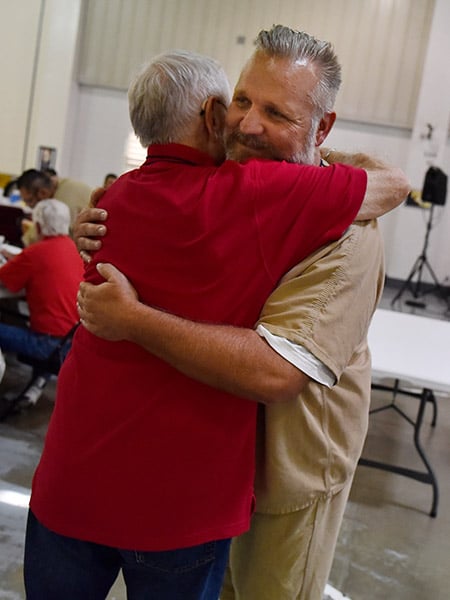
“What I heard people saying about the Church growing up is, I found, not what the Church teaches,” Humble said.
It’s a challenge at times, Humble said, residing in a prison where the majority of those professing Christianity are Protestant.
And yet, Biel said, about 40 percent of those attending his prison ministry sessions are non-Catholics. Which Biel sees as a plus.
“There are so many myths about the Catholic Church,” Biel said. “We come with two missions: to show the love of Jesus Christ and share the fullness of truth of the Catholic Church.
“This prison, like others in the South, is mainly Protestant so people put out misinformation. But then some [inmates] come here and they’re like, ‘Wait a minute.’”
Weekly ministry sessions and events like Kolbe, Humble said, go a long way toward dispelling myths about prison ministry in general and Catholicism in particular.
“It’s amazing to see the love from the volunteers and interaction between Catholics and non-Catholics,” Humble said. “The food is a draw, sure. But they’re here and learning something about the Catholic faith, which is an amazing thing.”
Inmate Cordero White, a non-Catholic, provided music during the retreat, playing drums in an ad hoc band consisting of inmates and volunteers.
White said Biel asked several months ago if he would play during the weekly ministry sessions.
“I told Howard I have a gift and I’m not going to reject playing for the Lord,” White said. “And I’ve enjoyed it, learning about Catholics and how they pray and other things.”
Prison ministry volunteer Cruz Jimenez, who also played music during the retreat, said he became involved at Biel’s behest, both men members of the same parish.
“I was looking for something more meaningful to do than just go to church every week because that’s what we’re supposed to do,” Jimenez said. “When we first started here maybe 12 guys would show up each week. Now it’s 60 or more so it’s showing results I think.”
Inmate Shane Pace said he became interested in Catholicism thanks to a mention of St. Francis in the introduction of the Book of James in his Protestant Bible and went on to delve into Catholic history and teaching. Pace now attends Mass and is in the process of converting, adding that while he attended church earlier in life, things never felt right until he discovered the Catholic Church.
“Jesus gave us His time and these [volunteers] give us theirs,” Pace said. “The fact they choose to come to prison and spend time with us, I mean, they had to force me to come but these people willingly come to visit us.”
The next step, Biel hopes, is to start RCIA classes within Bridgeport, which will be taught both by inmates and volunteers.
Biel’s is one of several prison ministry groups active in the diocese.
Roger Sickler is one of several volunteers and priests who regularly visit 14 correctional facilities throughout the diocese.
“It’s not a [ministry] for everyone,” Sickler admitted. “It takes a special person, but volunteers are always needed.”
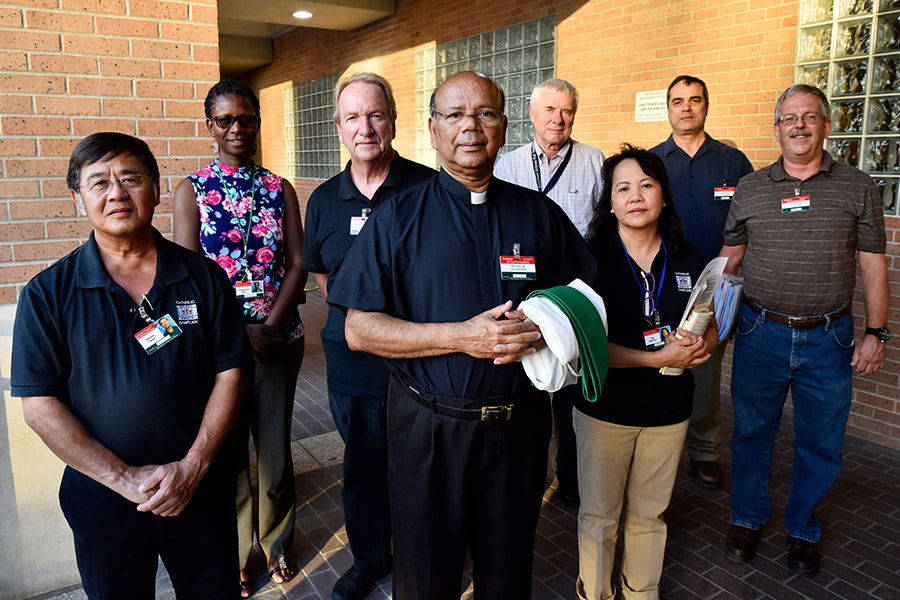
From left: Phong Tran, Rael Eckenroed, Roger Sickler, Fr. George Thennattil, Richard Malahowski, Van Nguyen, Frank Artiles, and John Kasper prepare to visit inmates at the Tarrant County Corrections Center in Fort Worth. (NTC photo/Ben Torres)
The need for volunteer ministers is huge as well.
“Our hope is to help make a change in their lives and keep them from coming back to prison once they get out,” Sickler said. “Something like 75 percent of those released return back within three years. That’s a huge cost moneywise but also spiritually.”
Sickler, a member of St. Michael Parish in Bedford, became involved in prison ministry 14 years ago as a way to give back and help.
“As I said, it takes a special kind of person, but it’s also not rocket science,” Sickler said. “I’m not a biblical genius by any means. Some of the inmates know the Bible better than us. Basically I learned the ropes on the job, following the leads of the chaplains and other volunteers.”
Success is difficult to gauge given that inmates come and go and/or transfer to other facilities. It’s also hard to ascertain why inmates choose to participate in many cases, but that’s not the point.
“It’s not our discernment to make,” said Deacon Bruce Corbett, a prison chaplain coordinator. “We’re simply here to provide ministry. These are guys and gals who made mistakes in life but who still need that spiritual and community connection. If the Church doesn’t provide that, they may not get it. You hope you make a difference, but again, we’re not there to judge.”
It’s the effort that counts, Sickler said.
“We do some good definitely,” Sickler said. “One fellow who was convicted of murder and sentenced to life without parole said, ‘I probably would have committed suicide if not for you guys.’”
Father George Thennattil, TOR, said he sees a desire for God on the part of most inmates.
“They want to participate in the Mass, confession, and [have] someone to talk to,” Fr. Thennattil said.
Dcn. Corbett agreed.
“Participation is voluntary; they sign up if they want,” Dcn. Corbett said. “We’re safe and well protected, never had any trouble. We’re providing a service for them, something they want to participate in. Talking to us for them is probably something different than interacting with the jailers.”
Alan Fowler, an inmate at the Tarrant County Corrections Center in downtown Fort Worth, said the visits definitely bring hope.
“I look forward to Mass, receiving the Eucharist, things I miss from being in the outside world,” Fowler said. “Talking to fellow Catholics helps as well. The [volunteers’] commitment means a lot too. They’re here every week, put in a lot of time. Knowing they’ll be here and go out of their way with that level of support means a lot.”
As it is at Bridgeport so it is at Tarrant County Corrections. Some inmates of other faiths, or no faith, often participate in prison ministry sessions as well, Fowler said.
“For some it’s mainly curiosity maybe,” Fowler said. “Honestly, some give it a try and figure it’s not for them but most are mainly appreciative and hungry, and it’s good to see God’s word extended. It gives us a chance to let God correct us and reflect on our lives and mistakes.”
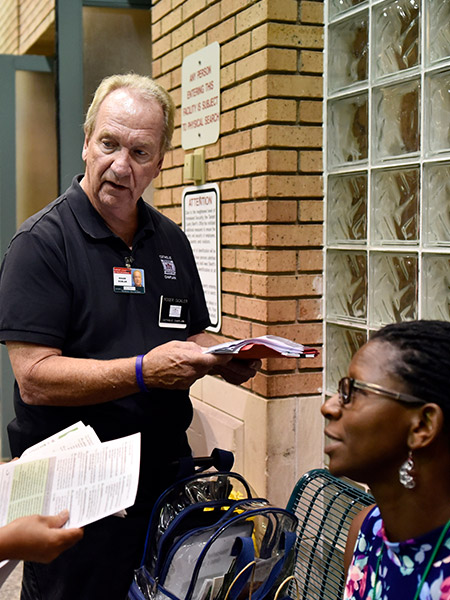
Johnson County Sheriff Adam King said prison ministry, Catholic and non-Catholic alike, plays a vital role in the rehabilitation process.
“There’s no way to quantify results,” King said. “But it makes a huge difference. I know that in my heart.
“As police officers we only deal with the symptoms. Prison ministers go in and deal with the real problems, people who are broken, forgotten, hurting, addicted in many cases. We deal only in crime, which is a side effect of those things.”
Johnson County Sheriff’s Office Capt. David Blankenship, who oversees jail operations, agreed.
“You see that it makes a difference in many cases,” Blankenship said. “A lot is up to the inmate. It has to hit in a point in their life where they’re ready to make a change. If that continues once they get out, who knows? But that’s certainly the hope, and I know [prison ministry] does make a difference a lot of times and is worthwhile.”
St. Michael parishioner Rael Eckenroed is one of the newest members of the prison ministry group and one of its few female volunteers.
“I’ve been in other ministries but they were overcrowded, and I knew they needed women ministers for this,” Eckenroed said. “Men can’t go into the women’s pod without a female.”
Eckenroed said she was nervous at first.
“Can’t take your cellphone in,” Eckenroed said. “The metal door banging behind me that first time and thinking, ‘Oh my God. Will I ever get out of here?’
“But after that first meeting with the women and sharing with them, that was it, no turning back for me.”
Volunteering, Eckenroed said, has increased her patience and understanding and exposed her to life from many perspectives.
“I never Google to find out why they’re here,” Eckenroed said. “I don’t care. They’re women with husbands, children, and friends like everyone else, who have made mistakes, but deserve God’s grace. I look forward to this. I’m tired sometimes, but always go. I want to be here. I want to do this.”
